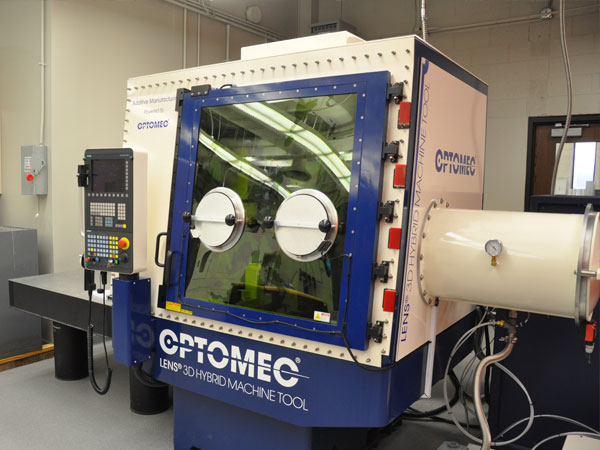Calendar Icon
Apr 19, 2018
Person Bust Icon
By Karl Vogel
![]() RSS
Submit a Story
RSS
Submit a Story

RELATED LINKS
With an investment of nearly $1.5 million and the installation of three unique hybrid 3-D printers, the College of Engineering is positioned on the cutting edge of additive manufacturing technology that will provide invaluable opportunities for faculty, students and industry.
The loading bay in Scott Engineering Center has been renovated to create the Nebraska Engineering Additive Technology (NEAT) Labs in a space big enough to house the three giant machines. The printers – two from Japanese manufacturer Matsuura and one from Optomec in New Mexico – are each close to 500 cubic feet and are hybrid printers, meaning they can add or subtract multiple materials to create a three-dimensional product.
Able to both add and subtract substances while printing, the printers are adept at sculpting many different types of materials – such as plastics or titanium – into highly complex three-dimensional shapes by using less material than conventional technology.
“This is incredibly rare, unique equipment that we’re now able to access,” said Michael Sealy, assistant professor of mechanical and materials engineering.
The Labs allow for printing projects using highly reactive materials such as magnesium, titanium, and aluminum and allow the part to be machined as it’s being built – a capability imperative for creating intricate geometries such as lattice structures and complex internal cooling channels for aerospace applications.
The printing possibilities could help to transform many industries, especially paired with the quality control systems development research of Prahalada Rao, assistant professor of mechanical and materials engineering and recent NSF CAREER Award recipient.
"Nebraska is positioning itself as a hub for additive manufacturing in a variety of industries, including agricultural equipment, manufacturing and biomedical," Rao said. "If this research is successful, it will have a huge impact on how quickly and reliably we can turn around new products and designs, spurring innovation in Nebraska."
On May 17, the NEAT Labs will introduce the new printers when it hosts the Great Plains Additive Manufacturing Symposium and Open House in 126 Scott Engineering Center, where the printers are, and other rooms in the college’s engineering complex.
The symposium will take place from 8 a.m. to 3:30 p.m. and will feature presentations by experts from The Boeing Company, the National Institute of Standards and Technology, Edison Welding Institute, National Nuclear Security Administration-Kansas City campus, Air Force Research Laboratory, America Makes and Navajo Technical University.
Registration for the symposium runs through May 12 and costs are $100 for attendees, $50 for students not enrolled at a University of Nebraska campus, or $40 for University of Nebraska faculty and students.
For more information about the symposium and open house or to register, go to https://engineering.unl.edu/NEAT/great-plains-additive-manufacturing-symposiumopen-house/
Sealy said students are also excited about getting to use the printers, and that the Department of Mechanical and Materials Engineering has already implemented a new additive manufacturing course – taught by Sealy and Rao – to take advantage of this technology.
“It gives students exposure to research problems as opposed to just the design problems that we get a lot of in our undergraduate curriculum. The students loved it,” Sealy said. “There’s lots of opportunities for students to get access, whether through student groups or our additive manufacturing class. That’s something we’re pushing – for them to get exposure and experience.”
Submit a Story